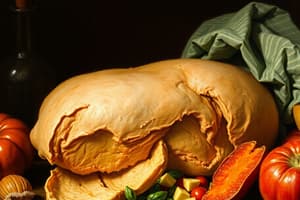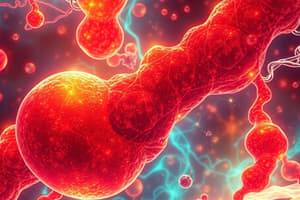Podcast
Questions and Answers
Which enzyme is required for the isomerization of intermediates during the oxidation of monounsaturated fatty acids?
Which enzyme is required for the isomerization of intermediates during the oxidation of monounsaturated fatty acids?
- Hydratase
- Dehydrogenase
- Reductase
- Isomerase (correct)
What is the final product of odd-numbered fatty acid oxidation after normal β-oxidation?
What is the final product of odd-numbered fatty acid oxidation after normal β-oxidation?
- Succinyl-CoA
- Acetyl-CoA
- Methylmalonyl-CoA
- Propionyl-CoA (correct)
Why is less energy produced during the oxidation of polyunsaturated fatty acids compared to saturated fatty acids?
Why is less energy produced during the oxidation of polyunsaturated fatty acids compared to saturated fatty acids?
- They produce fewer ATP molecules.
- NADPH is used in the process. (correct)
- They require more coenzymes.
- They contain more carbon atoms.
What is the main role of coenzyme B12 during the oxidation of odd-number fatty acids?
What is the main role of coenzyme B12 during the oxidation of odd-number fatty acids?
During the β-oxidation of monounsaturated fatty acids, which double bond configuration is typically problematic?
During the β-oxidation of monounsaturated fatty acids, which double bond configuration is typically problematic?
Which vitamin is essential for the synthesis of succinyl-CoA from methylmalonyl-CoA?
Which vitamin is essential for the synthesis of succinyl-CoA from methylmalonyl-CoA?
What is the primary effect of high glucose levels on fatty acid synthesis?
What is the primary effect of high glucose levels on fatty acid synthesis?
What happens to fatty acids due to the accumulation of malonyl-CoA?
What happens to fatty acids due to the accumulation of malonyl-CoA?
What are the three main ketone bodies produced from acetyl-CoA?
What are the three main ketone bodies produced from acetyl-CoA?
What condition results from the excessive accumulation of ketone bodies?
What condition results from the excessive accumulation of ketone bodies?
What is the primary role of carnitine in fatty acid metabolism?
What is the primary role of carnitine in fatty acid metabolism?
What is the net ATP yield from the complete oxidation of palmitic acid (C16)?
What is the net ATP yield from the complete oxidation of palmitic acid (C16)?
Which of the following is NOT a component of chylomicrons?
Which of the following is NOT a component of chylomicrons?
What initiates the hydrolysis of triglycerides in adipose tissue during fatty acid mobilization?
What initiates the hydrolysis of triglycerides in adipose tissue during fatty acid mobilization?
What is the first step in the oxidation of fatty acids in animal cells?
What is the first step in the oxidation of fatty acids in animal cells?
Flashcards
Fatty Acid Catabolism
Fatty Acid Catabolism
The breakdown of fatty acids for energy production in cells.
Fatty Acids
Fatty Acids
Long-chain hydrocarbon molecules; important energy sources stored in fats.
β-Oxidation
β-Oxidation
A metabolic pathway that breaks down fatty acids into acetyl-CoA molecules.
Carnitine Shuttle
Carnitine Shuttle
Signup and view all the flashcards
Acetyl-CoA
Acetyl-CoA
Signup and view all the flashcards
Unsaturated Fatty Acid Oxidation
Unsaturated Fatty Acid Oxidation
Signup and view all the flashcards
Odd-number Fatty Acid Oxidation
Odd-number Fatty Acid Oxidation
Signup and view all the flashcards
Isomerase
Isomerase
Signup and view all the flashcards
Propionyl-CoA
Propionyl-CoA
Signup and view all the flashcards
Coenzyme B12
Coenzyme B12
Signup and view all the flashcards
Succinyl-CoA synthesis
Succinyl-CoA synthesis
Signup and view all the flashcards
Methylmalonyl-CoA mutase
Methylmalonyl-CoA mutase
Signup and view all the flashcards
Vit B12 (Cobalamin)
Vit B12 (Cobalamin)
Signup and view all the flashcards
Fatty Acid Oxidation Inhibition
Fatty Acid Oxidation Inhibition
Signup and view all the flashcards
Ketone Bodies
Ketone Bodies
Signup and view all the flashcards
Study Notes
Fatty Acid Catabolism
- Fats are esters of glycerol and fatty acids.
- Highly reduced structures, similar to hydrocarbons, providing high energy.
- Liver and heart use fats for ~80% of energy.
- Fats are hydrophobic and inert, storing easily in lipid droplets without raising cell osmolarity.
- Fats are a sole energy source for hibernating animals and migratory birds.
Digestion, Mobilization, and Transport of Fats
- Bile salts emulsify dietary fats in the small intestine, forming mixed micelles.
- Intestinal lipases degrade triacylglycerols.
- Fatty acids and other breakdown products are absorbed by the intestinal mucosa and converted into triacylglycerols.
- Triacylglycerols are incorporated with cholesterol and apolipoproteins into chylomicrons.
- Chylomicrons travel through the lymphatic and bloodstream to tissues.
- Lipoprotein lipase converts triacylglycerols into fatty acids and glycerol.
Structure of Chylomicrons
- Size: 100-500 nm.
- Composition: triacylglycerols (80%), phospholipids, cholesterol, cholesterol esters, and apolipoproteins (lipid-binding proteins).
- Different combinations of lipids and proteins: chylomicrons, VLDL, and VHDL.
- Apolipoproteins are recognized by cell surface receptors.
Mobilization of Triacylglycerols Stored in Adipose Tissue
- Binding of epinephrine to adipocyte receptors stimulates adenylyl cyclase.
- cAMP activates PKA.
- PKA phosphorylates perilipin, making fats accessible to hormone-sensitive lipase (HSL).
- HSL hydrolyzes triglycerides into fatty acids and glycerol.
- Fatty acids leave adipocytes and are transported by serum albumin to muscles.
Metabolism of Glycerol
- Glycerol accounts for ~5% of total fat energy.
- Glycerol is converted into glyceraldehyde 3-phosphate and enters glycolysis.
- Phosphorylated species are trapped in the cytoplasm.
Fatty Acid "Activation"
- Enzymes for fatty acid oxidation are in the mitochondrial matrix.
- Fatty acids are conjugated with CoA in the cytoplasm before entering the mitochondria.
- Conjugation is highly exothermic due to pyrophosphate release, which is further hydrolyzed into phosphates.
Fatty Acid Transport into Mitochondria
- Carnitine acts as a fatty acid shuttle between the cytosol and the inner mitochondrial membrane.
- Fatty acids are converted into carnitine esters.
Oxidation of Fatty Acids
- In humans, beta-oxidation occurs primarily in the mitochondria.
- Stages involve sequential beta-oxidation rounds to generate acetyl-CoA, oxidation of acetyl-CoA to CO2, FADH2, and NADH using the citric acid cycle, and transfer of electrons to generate ATP.
Stage 1: Beta-Oxidation of Saturated Fatty Acids
- Sequential cycles of dehydrogenation, hydration, oxidation, and thiolysis use FAD, NAD+, and CoA.
- Producing Acetyl-CoA and shorter fatty acid chains.
Beta-Oxidation of Saturated Fatty Acids: Energy Balance
- Complete energy yield from palmitic (C16) acid to acetyl-CoA is 129 ATP.
- Each round of beta-oxidation generates 1 FADH2, 1 NADH, and 1 acetyl-CoA.
Monounsaturated Fatty Acid Oxidation
- Additional isomerase step needed for proper beta-oxidation.
Polyunsaturated Fatty Acid Oxidation
- Requires reducing power (NADPH).
- Fewer ATP compared to saturated fatty acids.
Mono/Polyunsaturated Fatty Acid Oxidation: Summary
- Most unsaturated fatty acids have the cis conformation, requiring special enzymes for beta-oxidation.
Oxidation of Odd-Number Fatty Acids
- Odd-number fatty acids yield propionyl-CoA as a final product.
- Propionyl-CoA is converted to succinyl-CoA, allowing entry into the citric acid cycle.
- Coenzyme B12 is necessary for succinyl-CoA formation.
Regulation of Fatty Acid Oxidation
- High glucose levels stimulate malonyl-CoA synthesis.
- Malonyl-CoA inhibits fatty acid transport into mitochondria.
Ketone Bodies – Alternative Fuel to Sugars
- Acetyl-CoA produced from fatty acid oxidation can form ketone bodies: acetoacetate, acetone, and beta-hydroxybutyrate.
- Ketone bodies are alternative fuels for tissues when glucose is unavailable.
- Accumulation results in ketoacidosis.
- Peripheral tissues can't use up ketone bodies fast enough with net acidosis.
Ketone Bodies Formation and Export from the Liver
- Starvation or poorly controlled diabetes leads to excess ketone production.
- Liver converts acetyl-CoA to ketone bodies.
- Ketone bodies are exported as energy sources for other tissues.
Drugs and Diseases
- Diseases: diabetes, diabetic ketoacidosis (metabolic acidosis).
- Drugs and vitamins: epinephrine, vitamin B12, hydroxocobalamin.
- Metabolites: chylomicrons, VLDL, LDL, HDL, ketone bodies.
Studying That Suits You
Use AI to generate personalized quizzes and flashcards to suit your learning preferences.





